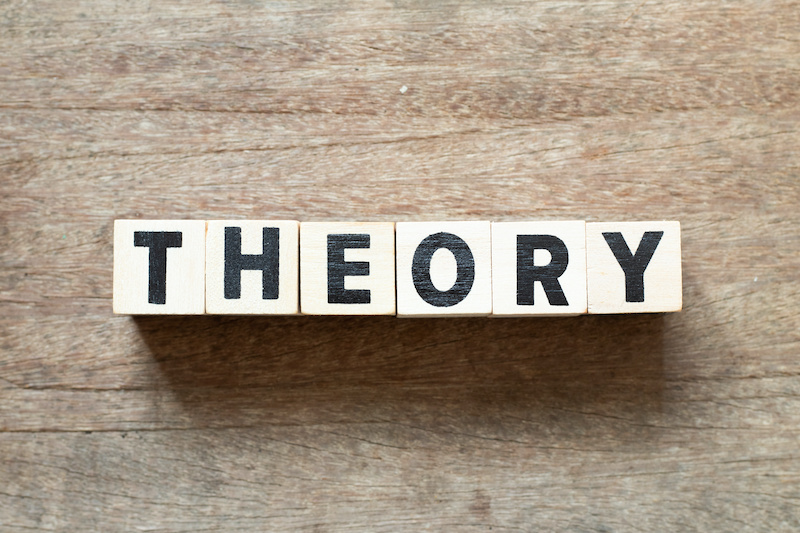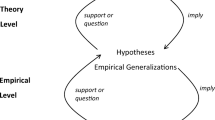Want to Get your Dissertation Accepted?
Discover how we've helped doctoral students complete their dissertations and advance their academic careers!

Join 200+ Graduated Students

Get Your Dissertation Accepted On Your Next Submission
Get customized coaching for:.
- Crafting your proposal,
- Collecting and analyzing your data, or
- Preparing your defense.
Trapped in dissertation revisions?

- Code of Ethics
- Dissertation Editing
- Dissertation Coaching
- Free Consultation
Theoretical Foundation: What Is it and How do You Write it?
One of the biggest decisions that you’ll make when researching and writing your dissertation is about the theoretical foundation of your research project (also sometimes referred to as the “theoretical framework”).
In the context of your dissertation, the theoretical foundation is just as important as it sounds. In order to have a clear purpose and a viable research proposal, you must first have a well-constructed and soundly built theoretical foundation to serve as the basis of your research.
Before you begin your research, it’s a good idea to make sure you understand your department’s expectations for how you will determine the theoretical foundation of your dissertation.
Before you get too far into the process, consult your dissertation advisor and relevant faculty members to get their thoughts and make sure you’re on the right path.
You may also find it helpful to look at successful dissertations written by graduates in your department and see how they approached the theoretical foundations of their dissertations.
Theoretical Foundation Questions

These are a few commonly asked questions about the theoretical foundation of a dissertation:
- What is a theoretical foundation?
- How do I determine the theoretical foundation of my dissertation?
- Where does it go in my dissertation?
- How do I write about theory?
What Is a Theoretical Foundation?
A theoretical foundation is a formal, peer-reviewed theoretical model (or models) that can be used to explain the issue that is driving your research. We often begin dissertations with a nagging question, or an observation that something has been overlooked.
A dissertation is our pursuit of using existing theory to refine that question and determine a way to answer it. Determining the theoretical foundation that will help us find a solution or greater clarity about the problem is the first step towards doing that.
The theoretical foundation of your dissertation will consist of one or more existing theories. In most–if not all–critical papers and works of academic scholarship, the argument being made is grounded in theory. Whether it’s scientific or humanistic, theory is the intellectual cornerstone upon which all academic research is built. A quick search of the reference section of any work of scholarship will show which theorists guided the author’s research.

When I began my dissertation, which was about the commodification of literary tourist sites in the South, I was faced with mountains of research as well as pages of my own observations to sift through. I knew what I wanted to study–at least vaguely–and the challenge was to find sufficient gaps wherein I could insert my own ideas and questions into the conversation. The first step to doing this was to make note of the myriad theories driving the scholarship that I was reading.
How Do I Determine the Theoretical Foundation of My Dissertation?
Read. Read every work of scholarship and piece of background material related to your topic that you can get your hands on. Take note of the theories being used in every article and book that you find relevant to your topic.
Once you’ve read the secondary research, trace the theory back to its original publication, paying attention to pertinent historical context. Determine the theory’s significance to your work moving forward.
For me, the process of determining the theoretical foundation of any project is one of the most exciting parts. I love it because it gives me an opportunity to immerse myself in research and to read for the purpose of discovery. It’s an interesting exercise to open up an article and examine the theories that wind the gears of the narrative to make the clock tick. Doing this has also taught me to be prepared for the unexpected.
When doing background reading for my dissertation and subsequent scholarship on my topic, one of the biggest surprises for me was how far afield I had to research in order to construct a sound theoretical foundation. While my topic was firmly rooted in my home field of Southern authors in American literature, I found myself needing theories created by economists and travel scholars to articulate my research question and inform much of my analysis.

Where Does the Theoretical Foundation Go in My Dissertation?
The short answer? Everywhere. The theoretical foundation is the guiding light of your dissertation, and it informs every aspect of it. Rather than thinking of it as just another box to check in your table of contents, know that your theoretical foundation is pervasive throughout your dissertation. In this way, the theoretical foundation is found in both the text and the subtext of your research, determining the shape and scope of your entire project.
For a slightly longer answer, check with your dissertation advisor. Some academic departments may mandate a specific section of your dissertation wherein you explicitly state your theoretical framework in a few paragraphs (typically as part of the introduction and/or the literature review). Otherwise, the expectation is that you will refer to your theoretical foundation throughout. Whether it’s in a specific section or not, the theoretical framework of your dissertation will shape everything from your introduction and research question to your literature review, methods section, and your final analysis.
How Do I Write About Theory?
After you’ve determined which theory or theories are most relevant to your topic, start building your case for how they can be applied to form your research question and shed light on the next steps. Be open to learning about theories used predominantly in fields beyond your own; you never know when you’ll strike gold and find a new way of looking at a major issue in your discipline.
It’s not easy to write about theory, and don’t let anyone tell you otherwise. Effectively communicating the nuts and bolts that hold a theory together and make it applicable to multiple research questions is some of the hardest work that we do as scholars. The good news is that if you’ve made it this far, you possess the knowledge and skills you need to be equal to the task. While the learning curve may feel a bit steep as you hurtle into the unknown, buckle up and try to enjoy the ride.
Related posts:

Courtney Watson, Ph.D.
Courtney Watson, Ph.D. is an Associate Professor of English at Radford University Carilion, in Roanoke, Virginia. Her areas of expertise include undergraduate and graduate curriculum development for writing courses in the health sciences and American literature with a focus on literary travel, tourism, and heritage economies. Her writing and academic scholarship has been widely published in places that include Studies in American Culture , Dialogue , and The Virginia Quarterly Review . Her research on the integration of humanities into STEM education will be published by Routledge in an upcoming collection. Dr. Watson has also been nominated by the State Council for Higher Education of Virginia’s Outstanding Faculty Rising Star Award, and she is a past winner of the National Society of Arts & Letters Regional Short Story Prize, as well as institutional awards for scholarly research and excellence in teaching. Throughout her career in higher education, Dr. Watson has served in faculty governance and administration as a frequent committee chair and program chair. As a higher education consultant, she has served as a subject matter expert, an evaluator, and a contributor to white papers exploring program development, enrollment research, and educational mergers and acquisitions.
Comments are closed.
- Chapter 1: Home
- Narrowing Your Topic
- Problem Statement
- Purpose Statement
- Conceptual Framework
Designing the Theoretical Framework
Theoretical framework guide, making a theoretical framework, example framework, additional framework resources.
- Quantitative Research Questions This link opens in a new window
- Qualitative Research Questions This link opens in a new window
- Qualitative & Quantitative Research Support with the ASC This link opens in a new window
- Library Research Consultations This link opens in a new window
What is it?
- A foundational review of existing theories.
- Serves as a roadmap or blueprint for developing arguments and supporting research.
- Overview of the theory that the research is based on.
- Can be made up of theories, principles, and concepts.
What does it do?
- Explains the why and how of a particular phenomenon within a particular body of literature.
- Connects the research subject with the theory.
- Specifies the study’s scope; makes it more valuable and generalizable.
- Guides further actions like framing the research questions, developing the literature review, and data collection and analyses.
What should be in it?
- Theory or theories that the researcher considers relevant for their research, principles, and concepts.
- Theoretical Framework Guide Use this guide to determine the guiding framework for your theoretical dissertation research.
How to make a theoretical framework
- Specify research objectives.
- Note the prominent variables under the study.
- Explore and review the literature through keywords identified as prominent variables.
- Note the theories that contain these variables or the keywords.
- Review all selected theories again in the light of the study’s objectives, and the key variables identified.
- Search for alternative theoretical propositions in the literature that may challenge the ones already selected.
- Ensure that the framework aligns with the study’s objectives, problem statement, the main research question, methodology, data analysis, and the expected conclusion.
- Decide on the final framework and begin developing.
- Theoretical Framework Example for a Thesis or Dissertation This link offers an example theoretical framework.
Some additional helpful resources in constructing a theoretical framework for study:
- https://www.scribbr.com/dissertation/theoretical-framework/
- https://www.scribbr.com/dissertation/theoretical-framework-example/
- https://www.projectguru.in/how-to-write-the-theoretical-framework-of-research/

Theoretical Framework Research
The term conceptual framework and theoretical framework are often and erroneously used interchangeably (Grant & Osanloo, 2014). A theoretical framework provides the theoretical assumptions for the larger context of a study, and is the foundation or ‘lens’ by which a study is developed. This framework helps to ground the research focus understudy within theoretical underpinnings and to frame the inquiry for data analysis and interpretation. The application of theory in traditional theoretical research is to understand, explain, and predict phenomena (Swanson, 2013).
Casanave, C.P.,& Li,Y.(2015). Novices’ struggles with conceptual and theoretical framing in writing dissertations and papers for publication. Publications,3 (2),104-119.doi:10.3390/publications3020104
Grant, C., & Osanloo, A. (2014). Understanding, Selecting, and Integrating a Theoretical Framework in Dissertation Research: Creating the Blueprint for Your “House. ” Administrative Issues Journal: Connecting Education, Practice, and Research, 4(2), 12–26
Swanson, R. (2013). Theory building in applied disciplines . San Francisco: Berrett-Koehler Publishers.
- << Previous: Conceptual Framework
- Next: Quantitative Research Questions >>
- Last Updated: Oct 30, 2024 5:45 PM
- URL: https://resources.nu.edu/c.php?g=1006886

© Copyright 2024 National University. All Rights Reserved.
Privacy Policy | Consumer Information
Theoretical Foundations
- First Online: 14 July 2022
Cite this chapter

- Elmar Schüll 10
Part of the book series: Zukunft und Forschung ((ZUFORSCH))
371 Accesses
1 Citations
How we understand and explain the world largely depends on our experiences and the expectations and presuppositions that attend them. In science, this phenomenon is known as “theory-dependent observation.” Futures researchers can produce high-quality work only if they keep in mind the importance of theoretical models for science and research.
This is a preview of subscription content, log in via an institution to check access.
Access this chapter
Subscribe and save.
- Get 10 units per month
- Download Article/Chapter or eBook
- 1 Unit = 1 Article or 1 Chapter
- Cancel anytime
- Available as EPUB and PDF
- Read on any device
- Instant download
- Own it forever
- Compact, lightweight edition
- Dispatched in 3 to 5 business days
- Free shipping worldwide - see info
Tax calculation will be finalised at checkout
Purchases are for personal use only
Institutional subscriptions
Similar content being viewed by others

From Empirical Problem-Solving to Theoretical Problem-Finding Perspectives on the Cognitive Sciences

The Debates on Scientific Realism Today: Knowledge and Objectivity in Science

Addressing the theory crisis in psychology
Chalmers ( 2013 ) provides an overview of the history and development of various theories of science. Voros ( 2007 ) shows their importance for futures studies. On the uses and limitations of critical rationalism in futures research, see Schüll & Berner ( 2012 ).
Theories claim to be generalizable, i.e. to describe mechanisms and relationships that are valid regardless of the time or place. Thus, a theory’s degree of generalizability is a criterion for its quality – the more general, the better. But this does not change the fact that theories are devised by human beings, and notwithstanding claims to “timeless” validity, will sooner or later be questioned, supplemented, or revised.
“A paradigm may be viewed as a set of basic beliefs […] that deals with ultimates or first principles. It represents a worldview that defines, for its holder, the nature of the ‘world,’ the individual's place in it, and the range of possible relationships to that world and its parts. […] The beliefs are basic in the sense that they must be accepted simply on faith (however well argued); there is no way to establish their ultimate truthfulness. If they were, the philosophical debates […] would have been resolved millennia ago” (Guba and Lincoln 1994, p. 107; quoted in Voros 2007 , p. 75).
Not surprisingly, theories of science have often been hotly contested. The positivism dispute and the value judgment controversy are two prominent examples (see Adorno 1993 and Dahms 2007 ).
Chalmers, A. F. (2013). What is this thing called science? 4 th ed., Maidenhead: McGraw-Hill.
Google Scholar
Dahms, H. J. (2007). Positivismusstreit: Die Auseinandersetzung der Frankfurter Schule mit dem logischen Positivismus, dem amerikanischen Pragmatismus und dem kritischen Rationalismus . Frankfurt/Main: Suhrkamp.
Grunwald, A. (2013). Wissenschaftliche Validität als Qualitätsmerkmal der Zukunftsforschung. Zeitschrift für Zukunftsforschung , 2. http://www.zeitschrift-zukunftsforschung.de/ausgaben/jahrgang-2013/ausgabe-2/3694 . Accessed: 28 May 2021.
Honneth, A. (1994). Kampf um Anerkennung: Zur moralischen Grammatik sozialer Konflikte . Frankfurt/Main: Suhrkamp.
Rust, H. (2008). Zukunftsillusionen: Kritik der Trendforschung . Wiesbaden: VS-Verlag für Sozialwissenschaften.
Schüll, E. & Berner, H. (2012). Zukunftsforschung, kritischer Rationalismus und das Hempel-Oppenheim-Schema. In R. Popp, Reinhold (Ed.), Zukunft und Wissenschaft: Wege und Irrwege der Zukunftsforschung . Berlin: Springer-Verlag.
Voros, J. (2007). On the philosophical foundations of futures research. In P. Duin (Ed.), Knowing tomorrow? How science deals with the future , 69–90. Eburon Academic Publishers.
Further Reading
Adorno, T. W. (1976). Der Positivismusstreit in der deutschen Soziologie: Zu Werturteilsdiskussion und Positivismusstreit . Darmstadt: Luchterhand.
Download references
Author information
Authors and affiliations.
Salzburg University of Applied Sciences, Salzburg, Austria
Elmar Schüll
You can also search for this author in PubMed Google Scholar
Corresponding author
Correspondence to Elmar Schüll .
Editor information
Editors and affiliations.
Research Forum on Public Safety and Security, Freie Universität Berlin, Berlin, Germany
Lars Gerhold
VDI Technologiezentrum GmbH, Düsseldorf, Germany
Dirk Holtmannspötter
FUTURESAFFAIRS, Büro für aufgeklärte Zukunftsforschung, Berlin, Germany
Christian Neuhaus
Foresightlab, Berlin, Germany
Beate Schulz-Montag
Z_punkt GmbH, Berlin, Germany
Karlheinz Steinmüller
Innovations- und Zukunftsforschung, RWTH Aachen University, Aachen, Germany
Rights and permissions
Reprints and permissions
Copyright information
© 2022 The Author(s), under exclusive license to Springer Fachmedien Wiesbaden GmbH, part of Springer Nature
About this chapter
Schüll, E. (2022). Theoretical Foundations. In: Gerhold, L., et al. Standards of Futures Research. Zukunft und Forschung. Springer VS, Wiesbaden. https://doi.org/10.1007/978-3-658-35806-8_9
Download citation
DOI : https://doi.org/10.1007/978-3-658-35806-8_9
Published : 14 July 2022
Publisher Name : Springer VS, Wiesbaden
Print ISBN : 978-3-658-35805-1
Online ISBN : 978-3-658-35806-8
eBook Packages : Behavioral Science and Psychology Behavioral Science and Psychology (R0)
Share this chapter
Anyone you share the following link with will be able to read this content:
Sorry, a shareable link is not currently available for this article.
Provided by the Springer Nature SharedIt content-sharing initiative
- Publish with us
Policies and ethics
- Find a journal
- Track your research

IMAGES
COMMENTS
research has no focus, drive, or purpose. Research is an attempt b y careful enquiry, ex perimentation, study, observation, a nalysis. and recording to: discover new facts, knowledge and ...
A theoretical foundation is a formal, peer-reviewed theoretical model (or models) that can be used to explain the issue that is driving your research. We often begin dissertations with a nagging question, or an observation that something has been overlooked. A dissertation is our pursuit of using existing theory to refine that question and ...
The study is enriely a library desk research without any fieldwork component. The study revealed the distinction, importance, construction and development of conceptual and theoretical frameworks.
Abstract. Academic research is built upon several key foundations that provide the framework for the systematic investigation of questions or problems. These foundational elements are essential for producing credible and valuable contributions to knowledge. In a scientific study, the main foundations of that guide academic research can include ...
This blurs the understanding of readers of the research paper who are lost, not knowing the purpose of the study, the importance of the study and the scholars the researcher is in dialogue with ...
The term conceptual framework and theoretical framework are often and erroneously used interchangeably (Grant & Osanloo, 2014). A theoretical framework provides the theoretical assumptions for the larger context of a study, and is the foundation or 'lens' by which a study is developed. This framework helps to ground the research focus ...
A theoretical framework is a foundational review of existing theories that serves as a roadmap for developing the arguments you will use in your own work. Theories are developed by researchers to explain phenomena, draw connections, and make predictions. In a theoretical framework, you explain the existing theories that support your research ...
he purpose of social research?Social research is used for three main purposes: (1) to explore a new idea, (2) to describe a current idea or event and (3) to test. cial research for exploration:You are unsure about a topic or issue and want further clarity and unders. nding on this issue or topic.Develop ten.
the basic scaffolding of research tools and terms; for the doctoral student and researcher, it provides a reference for particular areas of a study (for example, ontological and epistemological issues), and for all groups, it functions as an
An essential characteristic of good scientific research is a sound theoretical foundation. The interpretation of data, the methodology, the choice of the research question, and other research activities should not be based on "common sense," everyday intuitions, or subjective feelings, but on empirical findings and scientific models.